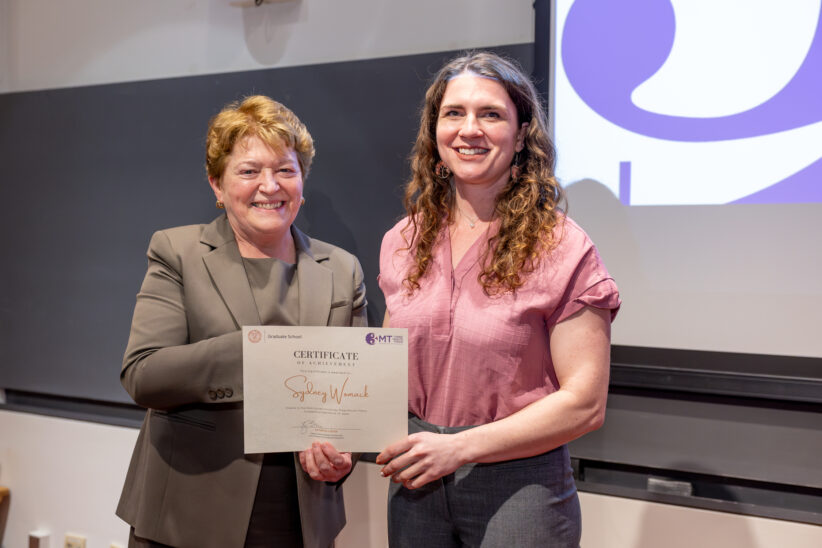Biomedical and Biological Sciences Ph.D. Candidate Wins 2025 Three Minute Thesis Competition
By Katya Hrichak

Photo: Simon Wheeler for Cornell University
“One in six people will develop knee osteoarthritis by the time they are 60 years old,” began Sydney Womack, a biomedical and biological sciences doctoral candidate and doctor of veterinary medicine student, at the 10th Cornell University Three Minute Thesis (3MT) competition. “Osteoarthritis is a joint disease which causes symptoms like pain and stiffness, and there are no drugs available that can slow the progression of the disease and are safe for people to use in the long term. Don’t you wish we had a way to really study diseases like osteoarthritis and develop new therapies?”
Alongside seven other finalists, Womack presented her dissertation research in just three minutes on March 19 to a panel of judges and an audience from across campus while additional friends, family, advisors, and lab mates watched online. Presentations were judged by how clearly and compellingly students summarized their research to a general audience, using only one static slide.
Womack’s presentation, “Joint Disease Across Species: The Bee’s Knees,” earned her first place and $1,500. Second place and $1,000 was awarded to food science and technology doctoral candidate Ranee Anderson for her presentation, “Phage on Patrol: A High-Speed Biosensor for Salmonella.”
After 107 in-person and virtual audience members cast their ballots, votes were tallied and the People’s Choice Award and $250 were presented to geological sciences doctoral candidate Sara Miller for her presentation, “The Motion of an Alien Ocean.”
The judges for Cornell’s 3MT included Jane Bunker, director for Cornell University Press; Marc Faris, senior manager for Custom Instructional Design at eCornell; Lyza Maron, grant development lead for Climate Finance Solutions and chief grants officer for Enzymatic; and Gregory Ray, Don and Margi Berens Professor of Entrepreneurship at the Cornell S.C. Johnson College of Business. Organization of the competition was provided by the Graduate School Office of Career and Professional Development.
“3MT gave me the opportunity to present my work in a way that a lot of people can understand and also made me think about my work in a different way. When you’re in the lab, just doing things at the bench or at the computer, it’s really easy to get lost,” said Womack. “It was really nice to take a step back and look at my research, see how it fits together, and turn it into a story that people might find interesting and engaging.”
In addition to wanting to conquer a fear of public speaking, Womack was inspired to compete by watching another student in her field who successfully pared down her research to just three minutes in the 2024 3MT. Anderson similarly thought that being able to speak on her topic in just a few minutes would be an “interesting challenge” with practical applications.
“It’s very good when you go to live conferences or anywhere, and people ask, ‘What do you do?’ Three minutes is enough time for them to listen,” she said, adding that the experience taught her how to adjust the way she speaks about her research for different audiences. “It was a very creative task to find words that everyone could understand and to make the research interesting to other people.”
Miller also enjoyed the process of crafting her presentation and applying science communication skills in a new way that will allow her to easily share her research going forward.
“I love having this three minute pitch,” she said. “I practiced it on some of my family members, and even my mom and my sister, people who I talk to regularly, said, ‘Wow, I didn’t realize what you did before this,’ so it’s pretty cool. I’m very proud to have something that I can give to extended family or a neighbor and for them to really understand what I do.”
The 3MT competition was first held in 2008 at the University of Queensland and has since been adopted by over 900 universities in over 85 countries. 3MT challenges research degree graduate students to present a compelling story on their dissertation or thesis and its significance in just three minutes, in language appropriate to a non-specialist audience.
Cornell’s Graduate School first hosted a 3MT competition in 2015 and the event has grown steadily since that time. As the winner of Cornell’s competition, Womack will now go on to compete in northeast regional competitions.
“The Three Minute Thesis final round is a highlight of the year for those of us in the Graduate School,” said Kathryn J. Boor, dean of the Graduate School and vice provost for graduate education. “It’s an opportunity to watch our accomplished and very creative graduate researchers communicate about their work, and all with the added excitement of prizes.”
